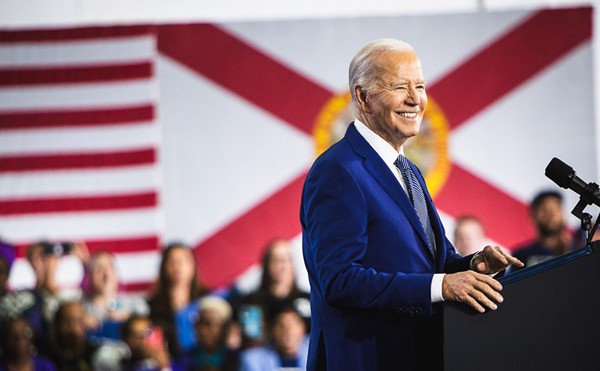Some time in December 2006, there was a lot more on the minds of some Kuhn Honda Volkswagen dealership employees in Tampa than just, oh, the new Honda Fit model that debuted in the middle of that year.
They had politics on their minds. Politics and cash.
The owner, Jason Kuhn, and more than a dozen employees and their spouses and friends at the Kennedy Boulevard dealership felt wronged by Tampa City Councilman John Dingfelder. They believed he screwed them over by opposing a plan for the dealership to start a luxury car lot across the street after neighbors opposed the plan.
In their minds, I'm sure, there was a solution to their problem: Julie Brown, a well-connected, first-time candidate who was running against Dingfelder in the spring 2007 election.
So one day, Kuhn approached his company's comptroller, Carol Van Scoik, and asked her to take two company checks to the bank, cash them and bring the resulting wad of bills — $15,000 total — back to the dealership. Then Kuhn and his comptroller proceeded to spend the next days and weeks walking around the dealership, picking up $500 campaign checks from employees for Brown's political effort — and reimbursing from Kuhn's cash.
We know the details of this behind-the-scenes politicking now, thanks to an investigation by the Florida Department of Law Enforcement, which filled in the details missing from a January 2007 St. Petersburg Times story about the Kuhn contributions. It seems a former Kuhn employee mentioned Kuhn's political largesse to a neighbor, who thought it sounded fishy and possibly illegal and dropped a dime to the newspaper reporter.
When the FDLE report was released last week, it came with a conclusion that startled some politicos who suspect that such reimbursements are widespread in politics: Kuhn would not be charged with any crimes.
This is where the story gets tricky and gray, thanks to a state statute in which ignorance of the law is actually a defense.
Kuhn, you see, is not a seasoned political fundraiser, not a mover-and-shaker in the halls of government. By all accounts, the 39-year-old attorney by college degree and entrepreneur by profession is a nice guy, one who raises lots of cash for pancreatic cancer research, who supports charitable endeavors at his workplace and among his workers.
Dingfelder's decision not to support the new car lot really stuck in his craw, but not because he didn't get his way, Kuhn's lawyer insists, but because of the way that Kuhn thought Dingfelder went back on his word to support the plan. (Dingfelder has previously denied giving such assurances.)
State law makes it illegal to give a contribution in another person's name, a law designed to prohibit people from flooding their own cash into a campaign in excess of the $500 personal or corporate limit. The FDLE report says two Kuhn employees were unhappy to be involved in the little scheme but concludes that "none of the employees were pressured by anyone to make the donations." Hundreds of pages of recorded and transcribed interviews with those same workers, done by Kuhn's lawyers at Barry Cohen's criminal defense firm, bear out that conclusion.
Then there is the matter of contrition. A few weeks after doling out the reimbursements, Kuhn learned that what he did might be illegal, so he sent Van Scoik out to retrieve all the cash payments, long before the story hit the Times.
So was this a carefully orchestrated attempt to circumvent campaign finance limits, or was it — as Kuhn's lawyer Stephen Romine insists and the record tends to bear out — the charitable actions of a political naïf who reimbursed many of his employees after the fact, without any quid pro quo or pressure or attempt to circumvent the contribution limits?
"He wasn't looking to line Julie Brown's pockets," Romine said late last week. (Kuhn did not return a telephone call for comment for this story.)
"Many of them had met Julie Brown and really disliked Dingfelder," Romine said. "When we went to interview these employees the majority of them were very eager to tell us about this."
Workers said they were not told to shut up about the reimbursements, and no one thought anyone was doing anything wrong. That's why they spoke freely about it, so freely that word of the situation leaked out to a neighbor.
All the questions about motivation aside, what is clear is why Kuhn won't be charged and that State Attorney Mark Ober made the right decision. The state law on this matter (Chapter 106.37, look it up) has a loophole you could drive a truck through. It requires that would-be criminals not only know it is wrong to give money under other people's names but that they are aware of the exact statute under which they are to be prosecuted. In other words, it has to be a provable "willful violation." I don't know of any other state law that has such a high bar for prosecutors to jump over.
In the end, however, the court of public opinion worked much more decisively than the legal system. Dingfelder beat Brown.















